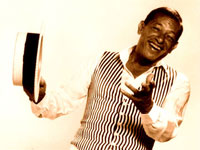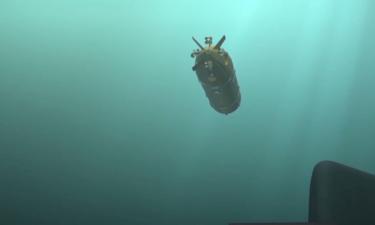French velvet voice Henri Salvador dies
By Anastasia Tomazhenkova: The velvet-voiced French musician Henri Salvador died at his Paris home of an aneurysm Wednesday. He was 90.

Salvador was known for his rich, catchy laugh, which is a subject in many of his humorous songs, for raucous sense of humor, silken singing and incredible staying power. He brought American rock 'n' roll to France and helped to create the music video.
He worked past his 90th birthday last year, he had planned to record a new album in 2008.
He ended his stage career with a farewell concert in December.
"I am the only one who can bow out while still alive," he said then.
Innovation was a constant force in Salvador's long and varied life, which took him from France's South American enclave Guiana to Paris' most prestigious stages - and won the hearts of generations of French fans.
His honeyed voice appeared to defy the passage of time, remaining smooth and supple until the end. Salvador chalked it up to his technique.
"I don't sing, I whisper," he told The Associated Press in a 2006 interview. "When you whisper into the mike, you are able to transmit real feeling."
Whether he was singing jazz, blues, rock 'n' roll or chanson francaise - traditional French pop - feeling was the key ingredient in Salvador's prolific and varied music.
Salvador was born July 18, 1917, in French Guiana into a middle-class family. His father, a municipal tax collector of Spanish descent, and his mother, a Caribbean Indian, both came from the French Caribbean island of Guadeloupe.
The family moved to Paris when Salvador was 7. A "dreamy child," Salvador said he had no particular interests or ambitions until a cousin played him records by Duke Ellington and Louis Armstong.
"I fell in love with their music," Salvador told The AP. "At age 12, I found my calling."
Salvador persuaded his father, who had set his sights on his middle child becoming a doctor or lawyer, to buy him his first guitar. He taught himself to play, practicing, he said, "17 or 18 hours a day, until my fingers bled."
The effort paid off when he auditioned for his first gig at 17.
"The head of the orchestra was blown away," Salvador said. "He asked me, 'Where did you come from?' and I told him, 'From my room."'
Salvador would play in orchestras for more than a decade - he toured South America with famed French bandleader Ray Ventura - before striking out on his solo career in 1946, as France emerged from World War II. Salvador served in the French army in 1937-41, but refused to respond to questions about his time as a soldier, saying only: "I'm a musician, not a fighter."
A performer of mythic proportions in France, Salvador was also a star in Latin America - particularly in Brazil, where he was often credited with inventing bossa nova.
Salvador rejected that claim, insisting the late Brazilian jazzman Antonio Carlos Jobim invented the style. Still, he admited Jobim struck on the concept behind bossa nova - slowing down samba's frenetic tempo - while listening to the classic Salvador number "Dans mon isle."
"When I recorded that little tune, holed up in my apartment in Paris, I could never have imagined it would change musical history," said Salvador. "For me, it was an extraordinary stroke of luck - and a great honor."
In the early 1950s, Salvador teamed up with two people who would mark his career, songwriter Boris Vian and Jacqueline Garabedian, who became his impresario and second wife.
With Vian, Salvador collaborated on more than 400 songs that ran the gamut of styles, from blues to French Caribbean beguines. The duo is also credited with importing rock 'n' roll to France, with the hit "Rock and roll mops."
Garabedian, who died in 1976, was a driving force behind Salvador's stardom. A savvy businesswoman, she understood the power of television and pushed her husband to embrace it. Salvador was among the first singers to set his songs to televised images, prompting some in France to call him the father of the music video.
In the 1970s, Salvador expanded his fan base with a series of children's albums that included the French-language soundtracks of Disney's "The Aristocats" and "Robin Hood."
Over the following decades, he continued to tour and churned out so many albums he said he had lost count of them.
Still, Salvador insisted he didn't worry about going down in musical history.
"I don't care a bit about that," he said. "When we disappear, the world still keeps turning. We are nothing."
Subscribe to Pravda.Ru Telegram channel, Facebook, RSS!





